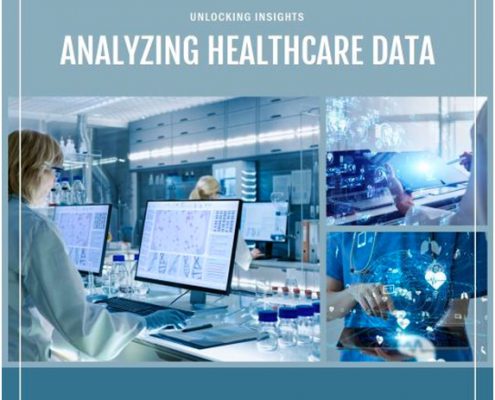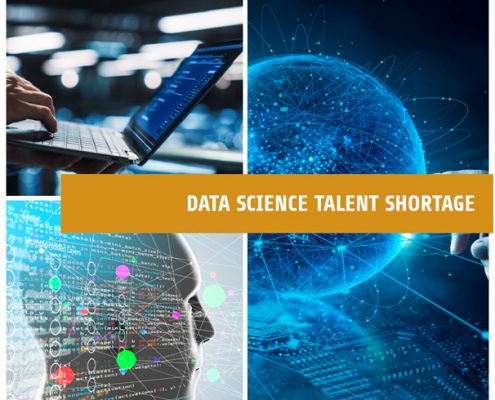The Growing Role of Data Scientists in Developing AI Solutions for Healthcare: Key Skills and Challenges in Hiring
In recent years, the role of data scientists in healthcare has grown exponentially as the industry increasingly harnesses the power of data to improve patient outcomes and streamline operations. Data scientists are now at the forefront of healthcare innovation, using their technical expertise and domain knowledge to uncover insights and develop AI solutions that have the potential to revolutionize patient care.
AI solutions are becoming increasingly important in healthcare as they enable medical professionals to make more informed decisions and provide personalized care to patients. AI-driven tools, such as predictive analytics, image analysis, and natural language processing, are being used to enhance diagnostics, treatment planning, and patient monitoring. By leveraging these advanced technologies, healthcare organizations can improve patient outcomes, reduce costs, and optimize the overall efficiency of their operations.
Given the growing role of data scientists in developing AI solutions for healthcare, it is vital for organizations to understand the key skills these professionals need and the challenges they may face in the hiring process. This blog aims to provide an in-depth discussion of the essential skills required for data scientists in healthcare AI solutions, the challenges in hiring and retaining top talent in this competitive field, and strategies for overcoming these challenges to ensure the successful development and implementation of AI-driven healthcare solutions.
The Significance of Data Scientists in Healthcare
Data scientists play a crucial role in managing and making sense of the vast amounts of complex healthcare data generated by hospitals, clinics, and other medical institutions. This data may include electronic health records, medical images, genomic data, and even social media information, among other sources. Data scientists need to be adept at handling this diverse and often unstructured data, preprocessing it and transforming it into a format that can be easily analyzed and used to derive meaningful insights.
One of the primary responsibilities of data scientists in healthcare is to analyze and interpret the available data to support better decision-making for medical professionals. By using advanced analytics techniques and machine learning algorithms, data scientists can uncover hidden patterns and trends in the data that can help in predicting patient outcomes, identifying potential risk factors, and optimizing treatment plans. These insights can greatly assist healthcare providers in making more informed decisions, ultimately leading to improved patient care and satisfaction.
Data scientists are at the forefront of creating AI models and algorithms that can significantly enhance healthcare processes and patient outcomes. By leveraging their expertise in machine learning and deep learning techniques, data scientists can develop predictive models that can, for instance, forecast disease progression or identify the most effective treatment options for a particular patient. Additionally, data scientists can create AI-driven tools that can aid in tasks such as medical image analysis and natural language processing, further supporting medical professionals in delivering more accurate diagnoses and personalized care. These AI solutions have the potential to revolutionize the healthcare industry, making the role of data scientists in healthcare more important than ever.
Key Skills Required for Data Scientists in Healthcare AI Solutions
Technical Skills
- Proficiency in programming languages (Python, R, etc.): Data scientists in healthcare must have a strong command of programming languages such as Python or R, which are commonly used for data analysis and model development. These languages enable data scientists to efficiently preprocess, analyze, and visualize data, as well as implement machine learning algorithms for healthcare AI solutions.
- Data manipulation and analysis: A crucial skill for data scientists in healthcare is the ability to manipulate and analyze large and complex datasets. This includes cleaning and preprocessing data, handling missing or inconsistent data, and using statistical techniques to explore, summarize, and interpret the data to derive meaningful insights.
- Machine learning and deep learning techniques: Data scientists working on healthcare AI solutions need to be well-versed in various machine learning and deep learning techniques, such as regression, classification, clustering, and neural networks. These techniques enable data scientists to develop predictive models and AI tools that can greatly enhance healthcare processes and patient outcomes.
Domain Knowledge
- Understanding of healthcare industry: A strong understanding of the healthcare industry is essential for data scientists working on AI solutions in this domain. This includes knowledge of healthcare processes, regulations, and challenges, as well as an understanding of the unique characteristics and requirements of the healthcare data.
- Familiarity with medical terminologies and concepts: Data scientists in healthcare should be familiar with relevant medical terminologies and concepts, enabling them to better understand the data and the specific problems they are trying to solve. This familiarity will also facilitate more effective communication with healthcare professionals and stakeholders.
Soft Skills
- Communication and collaboration: Effective communication and collaboration skills are vital for data scientists in healthcare AI solutions, as they often work closely with medical professionals, researchers, and other stakeholders to develop and implement AI-driven tools. Data scientists need to be able to clearly explain their findings, insights, and recommendations to non-technical audiences, as well as actively listen and respond to feedback.
- Critical thinking and problem-solving: Data scientists in healthcare must possess strong critical thinking and problem-solving abilities. They need to be able to identify potential issues and challenges in the data, develop creative solutions to address them, and continually refine their models and algorithms to improve their performance and accuracy.
- Ethical considerations in healthcare data: Data scientists working in healthcare must be aware of the ethical considerations surrounding the use of healthcare data, such as patient privacy and data security. They should be knowledgeable about relevant regulations and best practices, such as HIPAA, and ensure that their AI solutions adhere to these guidelines and maintain the highest standards of data privacy and security.
Challenges in Hiring Data Scientists for Healthcare AI Solutions
Competitive Job Market
- High demand for skilled data scientists: The demand for skilled data scientists, particularly those with expertise in healthcare AI solutions, has skyrocketed in recent years. This high demand has created a competitive job market, making it challenging for organizations to attract and retain top talent in this field.
- Limited pool of qualified candidates: Compounding the challenge of the competitive job market is the limited pool of candidates who possess the unique combination of technical skills, domain knowledge, and experience required for data scientists in healthcare AI solutions. This talent scarcity can make it difficult for organizations to find the right candidates for their needs.
Balancing Technical Skills and Domain Knowledge
- Finding candidates with a strong mix of both: One of the key challenges in hiring data scientists for healthcare AI solutions is finding candidates who possess both the technical skills and the domain knowledge necessary for success in this field. While many data scientists may have strong technical skills, they may lack the healthcare expertise needed to effectively develop and implement AI-driven solutions in this complex and highly regulated industry.
- Training and upskilling new hires: To address the challenge of balancing technical skills and domain knowledge, organizations may need to invest in training and upskilling new hires. This can involve providing specialized training programs, mentorship, and other resources to help data scientists acquire the necessary healthcare knowledge and skills while also further developing their technical expertise.
Ensuring Data Privacy and Security
- Understanding of HIPAA and other regulations: Data scientists working in healthcare AI solutions must have a thorough understanding of relevant regulations, such as HIPAA, which govern data privacy and security in the healthcare industry. This can be a challenge for organizations hiring data scientists, as they need to ensure that candidates are not only technically proficient but also knowledgeable about these regulations and their implications for AI-driven healthcare solutions.
Implementing robust data governance policies: To ensure data privacy and security in healthcare AI solutions, organizations must have robust data governance policies in place. This can be a challenge for organizations hiring data scientists, as they need to ensure that new hires are well-versed in these policies and can effectively apply them in their work. Additionally, organizations may need to invest in ongoing training and support to ensure that data scientists stay up-to-date on the latest regulations and best practices related to data privacy and security in healthcare.
Strategies for Successful Hiring
Utilizing Specialized Recruitment Agencies
One solution to address these hiring challenges is HopHR, our specialized recruitment agency focused on identifying and hiring top data scientists and analytics professionals for organizations. HopHR understands the unique combination of technical skills and domain knowledge required for data scientists in healthcare AI solutions, and they have a rich talent pool of candidates across various industries.
![]()
By leveraging HopHR ‘s expertise and services, healthcare organizations can streamline their hiring process, attract top talent, and ensure the successful development and implementation of AI-driven healthcare solutions. To learn more about how HopHR can help your organization hire top data scientists for healthcare AI solutions, visit our website at https://hophr.com.
Collaborating with Educational Institutions
Developing specialized programs and courses: One effective strategy for hiring data scientists in healthcare AI solutions is to collaborate with educational institutions to develop specialized programs and courses that focus on the unique skills and knowledge required in this field. This can help ensure a steady pipeline of talent with the appropriate technical skills and domain knowledge needed for success in healthcare AI roles.
Offering internships and research opportunities: Organizations can also partner with educational institutions to offer internships and research opportunities for students and recent graduates interested in healthcare AI solutions. This not only helps organizations identify and attract potential talent early in their careers but also provides valuable real-world experience for the students, better preparing them for future roles in the industry.
Creating a Strong Employer Brand
Highlighting company culture and values: To attract and retain top data scientist talent, organizations need to create a strong employer brand. This involves highlighting the company’s culture and values, such as innovation, collaboration, and commitment to improving patient outcomes. By showcasing the company’s unique qualities, organizations can differentiate themselves from competitors and appeal to data scientists who share similar goals and values.
Showcasing exciting projects and growth opportunities: To further enhance their employer brand, organizations should showcase the exciting projects and growth opportunities available to data scientists within the company. By highlighting cutting-edge projects and the potential for career advancement, organizations can demonstrate their commitment to employee growth and development, making them more attractive to top talent.
Investing in Employee Training and Development
Encouraging continuous learning: Organizations must invest in employee training and development to ensure that their data scientists have the necessary skills and knowledge to excel in their roles. This includes encouraging continuous learning through access to courses, workshops, and conferences, as well as providing opportunities for employees to collaborate and learn from one another.
Offering resources and support for skill development: In addition to fostering a culture of continuous learning, organizations should offer resources and support for skill development, such as mentorship programs, access to online learning platforms, and dedicated time for learning and development activities. By investing in employee training and development, organizations can not only attract top talent but also ensure their data scientists remain up-to-date on the latest technologies and best practices in the rapidly evolving field of healthcare AI solutions.
Final Thoughts
The role of data scientists in developing AI solutions for healthcare is becoming increasingly important. These professionals possess the unique combination of technical skills and domain knowledge required to effectively analyze and interpret complex healthcare data, develop AI models and algorithms, and ultimately improve patient outcomes.
In order to capitalize on the potential of AI-driven healthcare solutions, organizations must invest in hiring and developing the right talent. This involves not only identifying candidates with the necessary technical skills and domain knowledge but also fostering a culture that supports continuous learning, collaboration, and ethical considerations in healthcare data.
Finally, addressing the challenges in hiring data scientists for healthcare AI solutions requires collaboration between industry and academia. By partnering with educational institutions to develop specialized programs, courses, and internships, organizations can ensure a steady pipeline of talent with the appropriate skills and knowledge needed for success in the healthcare AI field.
To learn more about how HopHR can help your organization hire top data scientists for healthcare AI solutions, visit our website at https://hophr.com. Our team of experienced professionals is dedicated to connecting you with the right talent to drive innovation and improve patient outcomes in the healthcare industry.












